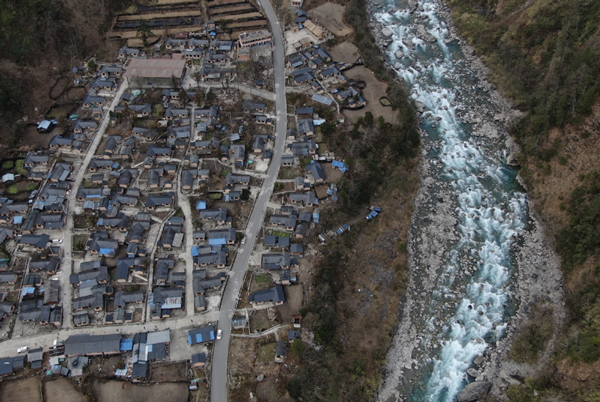
A bird's-eye view of Xiongdang village, Gongshan Derung and Nu autonomous county, Yunnan province. WANG JING/CHINADAILY
Remote area benefits from series of support measures
Visitors watch Li Wenshi as she weaves colorful traditional tapestries in Dizhengdang, a village tucked away in the mountains of Southwest China's Yunnan province.
Li, a member of the Derung ethnic group, is 77 and her face is covered in tattoos, which, according to legend, protect Derung women from attempts by outsiders to kidnap them. She sums up her life in the village in a single word — "gratitude", which she uses repeatedly.
The tapestries, which are popular as tourist souvenirs, were once worn in daily life and also traded for necessities such as salt. Li tells visitors that girls learned how to weave the tapestries when they were as young as 4 or 5.
Li's ancestors lived mainly in deep gorges alongside the Dulong River in northwest Yunnan. After enduring poverty and poor transportation links to the outside world, the group bade farewell to its primitive way of life only after the founding of New China in 1949.
Li said: "We didn't have good roads in the past. It took a week to travel from our village to Gongshan (Gongshan Derung and Nu autonomous county) — far too long to help villagers who were sick. But now, it takes less than three hours to reach the hospital in Gongshan, where I needed treatment when I fell ill at the end of December."
Although she was in hospital for several days, she said she recovered at little expense, "thanks to the government's healthcare measures".
In 2014, the travel time between Dizhengdang and Gongshan was reduced to around three hours when a major tunnel on the Dulongjiang Highway opened. To reach the county previously, villagers had to navigate their way through winding mountain roads, which were covered in snow for six months in winter.
Li witnessed the villagers leaving their shabby straw huts for comfortable concrete houses equipped with running water and electricity. They now also have access to the internet and good transportation services.
"We can do whatever we want in our house, such as selling traditional tapestries to visitors. We have access to the outside world, thanks to the internet. I couldn't be more grateful that our lives have improved so much," Li said.
She added that she even sang a song in the Derung dialect to show her gratitude to President Xi Jinping when she met him in January 2015 during his inspection tour of Kunming, capital of Yunnan.
Li said that Xi, who is also general secretary of the Communist Party of China Central Committee, encouraged people from all ethnic groups to keep up their good work. Xi told them that the CPC attaches great importance to their development.
The Derung people wrote to Xi in 2018, telling him the good news that the entire group had been lifted out of poverty. He wrote back, congratulating them on their success.
"Poverty eradication is only the first step; better days are yet to come," Xi said in his letter, adding, "Letting people from all ethnic groups have a good life has been my aspiration as well as our common goal."
The radical changes experienced by the Derung people are a telling example of Xi's people-centered development philosophy to meet the public's ever-growing needs for a better standard of living.
Gao Zhiying, a professor at Yunnan University studying the Derung group, said that based on her 20-plus years of research, the far-reaching changes witnessed by the group are the result of a series of targeted anti-poverty support measures introduced by the authorities.
This action has led to substantial improvements in the group's well-being, such as better transportation services, healthcare, education, housing and tourism, Gao said.